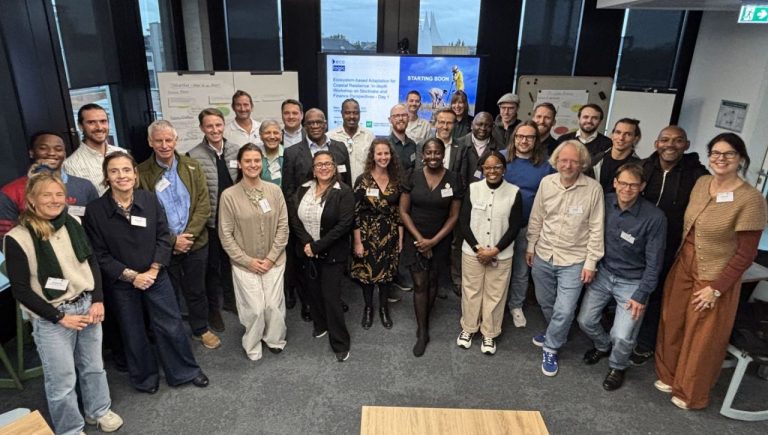In early October, Tom represented Blue Pangolin Consulting at the Ecosystem-based Adaptation for Coastal Resilience Workshop in Berlin, Germany. The event was organised by the Ecologic Institute and the German Federal Agency for Nature Conservation (BfN) under the TropicalAdapt project.
The workshop convened experts from around the world to review the progress of ecosystem-based adaptation (EbA) in coastal and marine systems. It focused on lessons learned, challenges, and the practical conditions needed for scaling nature-based solutions that strengthen climate resilience.
Tom delivered an impulse statement titled “Coral Reefs: Nature-based Solutions in Action”, which drew on Blue Pangolin’s work with the International Coral Reef Initiative (ICRI) and the Global Coral Reef Monitoring Network (GCRMN), namely in relation to restoration, resilience-based management and the Status of Coral Reefs of the World: 2025. He highlighted that coral reefs provide some of the clearest evidence of ecosystem-based adaptation in practice. When managed effectively, they protect coastlines, sustain livelihoods, and demonstrate measurable resilience to climate change.
Beyond the presentations, discussions in Berlin examined how to build stronger evidence for EbA outcomes and expand access to financing. Participants shared case studies from Mozambique, Cabo Verde, and the Caribbean, and explored emerging financing models such as blue carbon credits, community eco-credit schemes, and public-private partnerships. The exchange underscored that innovation in finance is growing, but continued progress depends on reliable data and consistent long-term monitoring.

Group photo of participants at the Ecosystem-based Adaptation for Coastal Resilience Workshop in Berlin, organised by UNEP, BfN, and the Ecologic Institute. Credit: Simone Wulf, BfN
Blue Pangolin’s intervention reinforced this message. Credible evidence is the foundation of effective adaptation, because it connects ecosystem health with real economic and social outcomes. Programmes such as the GCRMN provide precisely the type of data needed for policymakers and investors to understand the long-term value of nature-based solutions.
By contributing to these discussions, Blue Pangolin Consulting strengthened its role as a bridge between science, policy, and finance. The company’s participation reflected its broader expertise in project development, technical evaluation, and capacity building, and its commitment to helping governments and partners move from global ambition to local impact.





